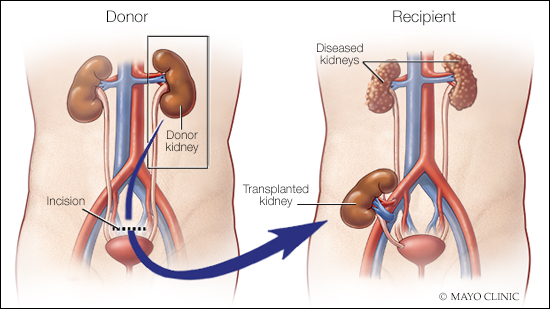Kidney Transplantation
Kidney transplantation is an operation that places a healthy kidney in your body. The transplanted kidney takes over the work of the two kidneys that failed, so you no longer need dialysis. During a transplant, the surgeon places the new kidney in your lower abdomen and connects the artery and vein of the new kidney to your artery and vein. Often, the new kidney will start making urine as soon as your blood starts flowing through it. But sometimes it takes a few weeks to start working. Many transplanted kidneys come from donors who have died. Some come from a living family member. The wait for a new kidney can be long. If you have a transplant, you must take drugs for the rest of your life, to keep your body from rejecting the new kidney.

Most people are born with two kidneys, located behind the abdominal organs and below the rib cage. They perform several important functions including:
- Filtering blood to remove waste products, passing the waste from the body as urine and returning water and chemicals back to the body as necessary.
- Regulating blood pressure by releasing several hormones.
- Stimulating red blood cell production by releasing the hormone erythropoietin.
The kidneys are two bean-shaped organs that produce urine. Urine is carried to the bladder and when the bladder is full, urine is excreted from the bladder through the urethra.
When the kidneys stop working, the condition is referred to as “end-stage renal disease.” Toxic waste products accumulate in the body and either dialysis or a kidney transplant is required to sustain life.
The most common causes of kidney failure include:
- Diabetes mellitus
- Glomerulonephritis
- High blood pressure
- Polycystic kidney disease
- Severe defects of the urinary tract
During a kidney transplant evaluation, a transplant coordinator will arrange a series of tests to assess your treatment options. You’ll be evaluated for potential medical problems such as heart disease, infections, bladder dysfunction, ulcer disease, and obesity.
